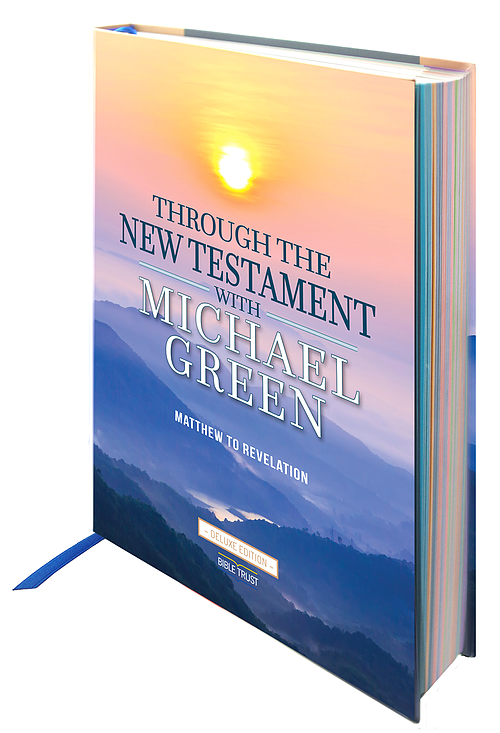Through the New Testament with Michael Green: Matthew to Revelation
Green's New Testament commentary is a big picture Bible study with both brevity and depth
 Through the New Testament with Michael Green: Matthew to Revelation
Through the New Testament with Michael Green: Matthew to Revelation
By Michael Green
Bible Trust
ISBN: 978-1-78690-389-1
Reviewed by Terry Young
This must have been the last thing Michael Green wrote before his death after a long and fruitful Christian life. However, he is still full of energy and focus as he drags you through the New Testament, pointing out the interesting sights and sounds, determined to leave you a wiser and more thoughtful Christian as a result.
I like ‘big picture’ Bible study aids that give you the tools to navigate and show how you might use them once your guide has moved on. The Baptist Times review of Andrew Ollerton’s recent contribution is a case in point. Fee and Stuart’s How to read the Bible for all its worth is another example.
Michael, however, has achieved the big picture, not by abandoning the detail of passages but by providing a brief commentary on every one of them. It’s a difficult trick to pull off, but his book is written as though it were a set of daily readings (which it could be). But because they are short (and you could read several passages and his note-vignettes in a sitting) you get a sense of the whole. It’s almost as though he has crafted a mosaic where you never linger long enough with any piece of beauty to lose sight of the greater whole.
It’s possible that I have this view because I deliberately sat down and read it through in a few sittings. I’m sufficiently familiar with the books of the New Testament (NT) to make sense of his micro-commentaries without having to read the passages. However, the fact that it took several sittings indicates that there is deep thinking buried in the brevity.
If you have never read the New Testament in its entirety, this is an excellent guide for you: try to get through 3-4 pages a day (with the NT readings) to maintain your moment and get a sense of the changing scenery as well as the connected unity of it all.
If you have read some and watched a few videos and maybe listened to sermons, this book will still have something for you. It’s not just the energy bursting from the page that may shake you out of that lethargy that can so easily drift over our Bible study, but there will be new things for you, too. An example for me was the four ways in which Rabbis were taught to understand a passage (the literal, the allegorical, the comparative (with similar passages) and the mystical (or inspired), interpretation.)
Although this is a bus tour where everything flashes past, rather than a walking tour, Michael has still provided us with the distinctive flavours of each writer: for instance, Matthew’s preoccupation with the Old Testament or Luke’s curiosity for detail, which has left us with such rich and accurate history. He even hints at why Peter’s first letter is so polished without diving into a discussion about the second letter that bears his name.
What you will not find is a systematic analysis of all the streams of theology that are out there. So, for instance, his take on Revelation is primarily in terms of what it would have meant to suffering Christians towards the end of the first century. He has pointed to the places where such a line is clearly inadequate, and he finds applications to our own day, but he paints with sharp colours and leaves us something to work with on our own.
The point is, we need study tools if we are to strike out on our own. When I was at school, our chemistry teacher introduced one lesson by saying he was going to tell us something that wasn’t true but that would be really helpful. He said, we should imagine that most atoms had hooks and that the number of hooks – which we had simply to learn – told us which compounds worked and which didn’t. Oxygen atoms, he explained, had two hooks, while hydrogen atoms had one – which is why water consists of a central oxygen connected to two hydrogen atoms positioned roughly on either side (for more complicated reasons, water molecules are more V-shaped). In time we found out how primitive that first lesson had been but without the hooks we’d never have learned enough to keep our interest or known what to replace our hooks with when we needed a more sophisticated explanation.
There is an element of this to Michael’s last book: not that it is in error, but he has taken a simple line to leave you with a clear framework that you can amend as your tastes develop. He has not shied away from technical terms – antinomian or premillennial, for instance – for you to chase down with your favourite search engine at your leisure. But he seems to have felt that chasing these things down would be your job, not his.
As preparation for your own expeditions in Bible study, this is, with a nod to Good King Wenceslaus, ‘deep and crisp and even.’
Professor Terry Young is an author and member of a Baptist church. He set up Datchet Consulting which combines his experience in industry and academia
Baptist Times, 01/10/2021